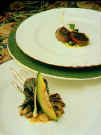






|
|
 |
| Two
courses of a light 3 course lunch menu themed to the Southwest |
Time of Year
- The chef should
focus on seasonality, availability, freshness, cost, and customer
expectations for the season. An example would be serving game, pumpkin,
and root vegetables in the fall.
The Occasion - Is this a formal or informal event? What will the
guests' expectations be? One would have a different expectation for a menu
on New Year's Eve versus the 4th of July.
Time of Day - The portion size, length of meal, and service and
complexity of the menu are often different from lunch to dinner.
Location - The actual geographic area and the location of the party
itself has a bearing upon the menu selection. The geographic area dictates
the availability of products, climate, and, in some cases, the level of
formality. The location of the party, meaning indoors or outdoors, or the
theme of the venue will determine the formality of the dress as well as
the meal, equipment available to execute the menu, and overall guest
expectations.
Number of Guests - What may be properly executed for a party of 15
is, in most cases, different than what can be executed for a party of 100.
Food such as soufflés that may work well for a small party should not
usually be considered for larger parties.g
Guest Profile - What is the level of sophistication? To what degree
will the guests feel comfortable with formality? What are their likes and
dislikes?
Budget
- This, of course, quickly dictates service style and menu composition.
The guest check average your customers are comfortable paying or the
amount budgeted for the food and beverage portion of a party is necessary
information before planning begins.
Once you have thoroughly addressed these considerations, serious planning
may begin. For our purposes here, we will focus on course meals, which are
sometimes referred to as gastronomic, as they require extensive planning
in selecting the menu to create the desired experience for guests. This is
as opposed to the creation of an a la carte menu, which allows guests the
freedom to design their own experience. The menu logic of each remains the
same in either case.
         

|